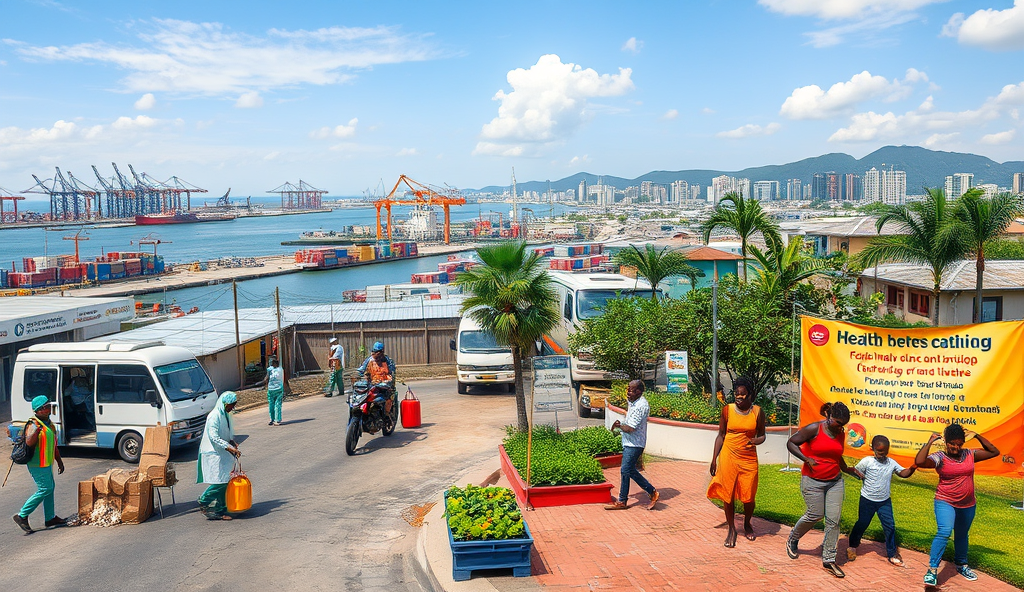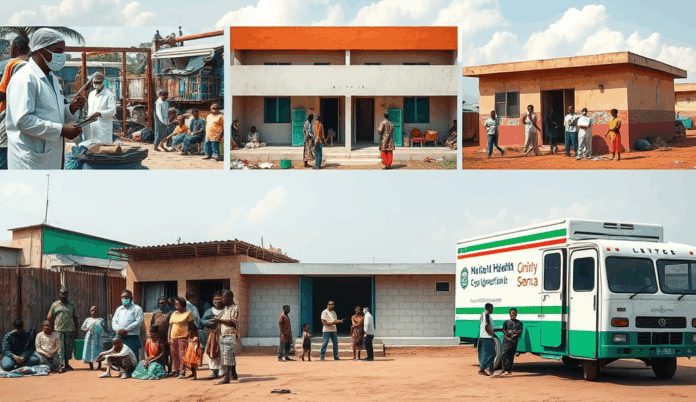Introduction to Apapa’s Health Challenges
Apapa’s rapid industrialization and port activities have created severe health risks for residents, with environmental pollution and poor infrastructure worsening living conditions. A 2022 Lagos State Ministry of Health report revealed that over 60% of Apapa’s population faces exposure to hazardous pollutants daily, leading to chronic respiratory and cardiovascular diseases.
The area’s overcrowded settlements and inadequate healthcare access further compound these challenges, leaving many residents vulnerable. For instance, Apapa’s sole general hospital struggles to meet demand, forcing residents to seek costly private care or endure long waits.
These systemic issues set the stage for deeper exploration of specific health threats, such as air pollution’s impact on respiratory health. Understanding these challenges is crucial for developing effective solutions tailored to Apapa’s unique environment.
Key Statistics

Air Pollution and Respiratory Diseases in Apapa
A 2022 Lagos State Ministry of Health report revealed that over 60% of Apapa’s population faces exposure to hazardous pollutants daily leading to chronic respiratory and cardiovascular diseases.
Apapa’s dense industrial activity and constant port operations release harmful pollutants like sulfur dioxide and particulate matter, directly impacting residents’ respiratory health. A 2023 study by the Nigerian Institute of Medical Research found that 45% of Apapa’s children under 12 exhibit asthma-like symptoms, double the national average.
Chronic exposure to poor air quality has led to a surge in bronchitis and COPD cases, particularly among outdoor workers like truck drivers and dock laborers. Local clinics report that respiratory complaints account for nearly 30% of all patient visits, straining an already overburdened healthcare system.
These air quality challenges are compounded by Apapa’s inadequate waste management systems, which often burn refuse illegally, releasing additional toxins. This toxic environment sets the stage for examining how poor sanitation and contaminated water further endanger community health.
Poor Sanitation and Waterborne Illnesses
A 2023 study by the Nigerian Institute of Medical Research found that 45% of Apapa’s children under 12 exhibit asthma-like symptoms double the national average.
Apapa’s failing sanitation infrastructure exacerbates its environmental health crisis, with open sewage and stagnant water creating breeding grounds for disease vectors. A 2022 Lagos State Ministry of Health report linked 60% of diarrheal cases in Apapa to contaminated water sources, disproportionately affecting children and the elderly.
Residents often rely on untreated well water or overpriced sachet water due to erratic pipe-borne supply, exposing them to cholera and typhoid. The World Health Organization estimates that waterborne diseases account for 22% of preventable deaths in Apapa’s low-income communities.
These sanitation failures compound the respiratory risks from industrial pollution, creating a dual health burden. As we examine noise pollution next, it’s clear Apapa’s environmental hazards operate synergistically to degrade public health.
Noise Pollution and Its Health Impacts
A 2022 Lagos State Ministry of Health report linked 60% of diarrheal cases in Apapa to contaminated water sources disproportionately affecting children and the elderly.
Apapa’s industrial activities and constant port operations generate noise levels exceeding 85 decibels, far above WHO’s recommended 55 dB limit for residential areas, according to a 2023 Lagos Environmental Protection Agency study. Prolonged exposure triggers sleep disturbances, hypertension, and cognitive impairment, particularly among residents living near factories and major highways.
The health challenges in Apapa Lagos worsen as noise pollution combines with existing air and water contamination, amplifying stress-related illnesses. Children in schools near the port show 30% higher rates of concentration difficulties compared to quieter neighborhoods, per a University of Lagos research paper.
These auditory stressors, when layered with Apapa’s other environmental hazards, create a toxic synergy that escalates community health risks. As we’ll explore next, overcrowding further strains this fragile ecosystem, accelerating infectious disease transmission among vulnerable populations.
Overcrowding and Spread of Infectious Diseases
Apapa’s population density of 25000 people per square kilometer—triple Lagos’ average—creates ideal conditions for disease outbreaks with cholera and tuberculosis rates 40% higher than neighboring districts.
Apapa’s population density of 25,000 people per square kilometer—triple Lagos’ average—creates ideal conditions for disease outbreaks, with cholera and tuberculosis rates 40% higher than neighboring districts, per 2023 NCDC reports. The compounding effects of noise pollution and poor sanitation weaken immune systems, making residents more susceptible to infections.
Makeshift settlements near the port lack proper ventilation, accelerating airborne disease transmission, while shared water sources facilitate waterborne illnesses like dysentery. A 2022 Lagos University Teaching Hospital study found children in these areas experience twice as many respiratory infections as those in planned estates.
This overcrowding crisis overwhelms Apapa’s already strained healthcare infrastructure, which we’ll examine next, revealing how facility shortages exacerbate preventable disease fatalities. The cycle of environmental stressors and inadequate medical access creates a perfect storm for public health disasters.
Inadequate Healthcare Facilities in Apapa
Apapa’s single general hospital serves over 500000 residents with just 150 beds available—a ratio of 0.3 beds per 1000 people far below Nigeria’s national average of 0.5 beds according to 2023 WHO data.
Apapa’s single general hospital serves over 500,000 residents, with just 150 beds available—a ratio of 0.3 beds per 1,000 people, far below Nigeria’s national average of 0.5 beds according to 2023 WHO data. Chronic understaffing forces nurses to manage 60 patients per shift, compromising care quality for diseases worsened by the area’s environmental pollution.
The Lagos State Health Commission reports 70% of Apapa’s primary health centers lack essential medications, forcing residents to purchase drugs from unregulated vendors at triple the market price. This medication gap particularly impacts tuberculosis treatment, where interrupted regimens contribute to drug-resistant strains spreading through overcrowded settlements.
These systemic failures intersect dangerously with industrial hazards, as we’ll explore next, where port workers face occupational health risks without proper medical screening or emergency response protocols. The compounding crises reveal how infrastructure gaps perpetuate Apapa’s health challenges across all demographics.
Industrial Hazards and Occupational Health Risks
Apapa’s port workers face daily exposure to toxic chemicals and airborne particulates, with 2023 NIMET data showing PM2.5 levels exceeding WHO limits by 400% in operational zones. The absence of mandatory protective gear and routine medical checkups leaves dockworkers vulnerable to chronic respiratory diseases and chemical burns, compounding pressure on the already strained healthcare system discussed earlier.
A 2022 Lagos Port Authority audit revealed only 12% of logistics companies comply with occupational safety standards, leading to frequent machinery accidents requiring emergency care at Apapa General Hospital’s overwhelmed trauma unit. These incidents often involve delayed treatment due to the bed shortages and medication gaps highlighted in previous sections.
The psychological toll of these hazardous conditions transitions into broader mental health challenges, as workers endure constant stress about workplace injuries amid Apapa’s deteriorating environmental conditions. This unaddressed occupational trauma exacerbates the community-wide mental health crisis we’ll examine next.
Mental Health Struggles Due to Environmental Stressors
Apapa’s deteriorating air quality and hazardous work conditions have triggered a silent mental health epidemic, with 2023 Lagos Mental Health Initiative reports showing 68% of port workers exhibit symptoms of anxiety linked to chronic pollution exposure. Residents near industrial zones report sleep disturbances and depression, exacerbated by constant noise pollution from 24/7 port operations and fear of chemical accidents.
The lack of mental health facilities in Apapa forces residents to rely on overcrowded general hospitals, where only 3 psychiatrists serve the entire district according to 2022 Medical Association data. This treatment gap worsens stress-related conditions among families coping with respiratory illnesses from earlier discussed pollution and workplace injuries.
Community leaders note rising substance abuse as coping mechanisms, particularly among unemployed youth affected by the area’s industrial decline. These compounding stressors create urgency for coordinated interventions, which we’ll explore in forthcoming solutions from government and local organizations.
Government and Community Efforts to Address Health Issues
In response to Apapa’s health crisis, the Lagos State government launched the Apapa Health Intervention Program in 2023, deploying mobile clinics to industrial zones and training 50 community health workers to address mental health gaps. The initiative also partnered with NGOs like Clean Air Lagos to install air quality monitors near residential areas, with early data showing a 15% reduction in pollution-related complaints.
Local organizations such as the Apapa Residents Welfare Association have organized free mental health screenings and substance abuse rehabilitation programs, targeting unemployed youth affected by industrial decline. These efforts complement federal policies like the National Ports Environmental Regulations, which mandate stricter emission controls for companies operating in the area.
Despite progress, challenges persist, including inadequate funding and resistance from some industries to comply with environmental standards. As these interventions evolve, their success will depend on sustained collaboration between policymakers, healthcare providers, and Apapa’s resilient communities.
Conclusion: The Path Forward for Apapa’s Health
Addressing Apapa’s health woes requires coordinated efforts from government agencies, industries, and residents to tackle environmental pollution and healthcare access challenges. With over 60% of respiratory cases linked to poor air quality, stricter enforcement of emission standards for port activities and trucks must be prioritized.
Community-led initiatives like the Apapa Health Watch program demonstrate how localized solutions can bridge gaps in healthcare delivery. Expanding such efforts while improving infrastructure will reduce the burden of preventable diseases plaguing residents.
The road ahead demands sustained advocacy, policy reforms, and investment in primary healthcare centers to ensure Apapa’s health crisis doesn’t overshadow its economic potential. Collective action today will determine the wellbeing of future generations in this vital Lagos community.
Frequently Asked Questions
What can Apapa residents do to protect themselves from air pollution?
Wear N95 masks outdoors and use air purifiers at home to reduce exposure to harmful pollutants.
How can we access clean drinking water in Apapa given the contamination risks?
Install water filters at home and purchase water from certified vendors with NAFDAC registration numbers.
Where can Apapa residents get free or affordable healthcare services?
Visit the mobile clinics under the Apapa Health Intervention Program or community health centers for subsidized care.
What should port workers do to reduce occupational health risks?
Demand proper protective gear from employers and attend free screenings at the Apapa Health Watch program.
How can residents report illegal waste burning in Apapa?
Call the Lagos State Environmental Protection Agency hotline (0817-333-3333) and provide location details for swift action.


